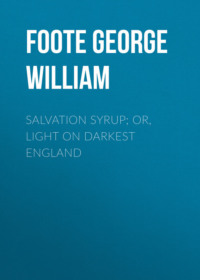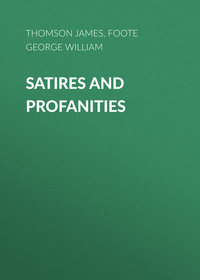 полная версия
полная версияBible Romances, First Series
The third act of this tragi-comedy was decisive in one sense, for in it the magicians of Egypt were obliged to retire from the competition. Aaron stretched forth his rod again and smote the dust of the earth, all of which instantly became lice, in man and in beast. Before this dirty miracle the magicians of Egypt shrank dismayed. They made a feeble and altogether unsuccessful attempt to imitate Aaron's performance, and then drew back, declining to continue the contest. The lice settled them. "This," said they, "is the finger of God." But Pharaoh still refused to knuckle under. Even against the force of this supreme wonder his heart was steeled.
So the fourth plague came. A grievous swarm of flies descended on Egypt, so that "the land was corrupted by reason of them. But not a single fly crossed over into the land of Goshe" where the Jews dwelt. Thereupon Pharaoh called for Moses and Aaron, and told them he was willing to let their people go and sacrifice to the Lord for three days, but not outside Egypt. Moses reiterated his demand for a three days' journey into the wilderness. Whereto Pharaoh replied that they might go, but "not too far." Moses then undertook to banish the flies. And he was as good as his word; for there was made such a clean sweep of them that "not one remained." This precious narrative always runs to extremes. Egypt without a fly in it would be in a very abnormal condition. At ordinary times the land is infested with flies; so much so, indeed, that large numbers of the people suffer from diseased eyes, in consequence of these insects incessantly fastening on the sores caused by the irritating sand which fills the air. It was absurd for this Hebrew story-teller to scotch the last fly; he should have left sufficient to maintain the character of the country.
Again Pharaoh's heart was hardened, and when the flies were banished he refused to "let the people go." So the fifth plague came. A "very grievous murrain," which spared the cattle of Israel, broke out on the cattle of Egypt, and with such virulence that they all died. Pharaoh found on inquiry that there was "not one of the cattle of the Israelites dead," yet for all that his heart was hardened, and he would not let the people go.
So the sixth plague came. Aaron took "handfuls of ashes of the furnace," which Moses sprinkled towards heaven, and "it became a boil breaking forth with blains upon man and upon beast." Even the magicians were afflicted. Now the readers will bear in mind that all the cattle of Egypt were killed by the fifth, plague. What beasts, then, were these tortured with boils? Were they dead carcasses, or were they live cattle miraculously created in the interim? Surely this is a thing which "no fellah can understand." From the serpent of Eden to Jonah's whale, the animals of the Bible are a queer lot.
Pharaoh's heart remaining still hardened, God commanded Moses to make a special appeal to him, and to get up early in the morning for that purpose. So Moses stood before Pharaoh and said, "Thus saith the Lord God of the Hebrews, let my people go, that they may serve me. If you refuse I shall plague you and your people worse than ever, and so teach you that there is none like me in all the earth. Don't puff yourself up with conceit, for you were made what you are only in order that through you my power might be manifested. You had better cave in at once." But Pharaoh would not harken. He tacitly declared that the Lord God of the Hebrews might go to Jericho.
So the seventh plague came. A fierce hail, accompanied by fire that ran along the ground, smote all that was in the field, both man and beast. It smote also every herb of the field and brake every tree of the field. Only those were saved who "feared the Lord" and stayed in doors with their servants and cattle. Fortunately the wheat and the rice were spared, as they were not grown up; or there would have been a famine in Egypt compared with which the seven years of scarcity in Joseph's time had sunk into insignificance. Pharaoh now relented and repented. "I have sinned this time," he said, "the Lord is righteous, and I and my people are wicked." And Moses, seeing that the king had recognised Jehovah as the true cock of the theological walk, procured a cessation of the thunder and the hail. But lo! when Pharaoh perceived this, he hardened his heart again, and "sinned yet more." The obduracy of this potentate, under the manipulation of God, is really becoming monotonous. So the eighth plague came. After a day and a night of east wind, a prodigious swarm of locusts went up over the land of Egypt, covering the face of the whole earth, and darkening the ground. They "did eat every herb of the land, and all the fruit of the trees which the hail had spared." But we were told that the hail smote every herb, and brake every tree. What then was left for the locusts to eat? The writer of this narrative had a very short memory, or else a stupendous power of belief.
Again Pharaoh confessed that he had sinned. The locusts were cleared away, and so effectually that "not one remained." But "the Lord hardened Pharaoh's heart" for the eighth time, and he refused to let the people go. Whereupon Moses brought darkness over the land of Egypt, a thick darkness that might be felt. This thick darkness lasted in Egypt for three days, during which time the people "saw not one another, neither rose any from his place." We presume, therefore, that they all starved for that time. Poor devils! What had they done to be treated thus? All the children of Israel, however, had light in their dwellings. Why then did they not avail themselves of such a fine opportunity to escape? It was a splendid chance, yet they let it slip. Perhaps Moses did not give the word, and they were like a flock of sheep without him. Perhaps they wished to stay and see the rest of the fun. For more was coming, although it was anything but fun to the poor Egyptians.
To them indeed it was an awful tragedy such as we lack words to describe. Moses commanded the Jews to take a male lamb for each household, to kill it, and to daub its blood over the two side-posts and on the upper door-posts of their houses. The flesh they were to eat in the night, roasted, with bitter herbs and unleavened bread, as the inauguration of the Passover. The Lord meant to pass through the land in the dark, and slay all the firstborn in Egypt; and lest he should make some mistakes he required the Jews' houses to be marked with blood so that he might distinguish them. We should expect God to dispense with such "aids to memory." What followed must be told in the language of Scripture: "At midnight the Lord smote all the firstborn in the land of Egypt, from the firstborn of Pharaoh that sat on the throne unto the firstborn of the captive that was in the dungeon; and all the firstborn of cattle. And Pharaoh rose up in the night, he, and all his servants, and all the Egyptians; and there was a great cry in Egypt; for there was not a house where there was not one dead." The reader's imagination will picture the horror of this scene. That "great cry in Egypt" arose from a people who were the first victims of God's hatred of all who stood in the way of his chosen "set of leprous slaves." And in this case the tragedy was the more awful, and the more inexcusably atrocious, because God deliberately planned it. He could easily have softened Pharaoh's heart, but he chose to harden it. He could have brought his people out of Egypt in peace, but he preferred that they should start amidst wailings of agony, and leave behind them a track of blood.
Yet in the tragedy there is a touch of comedy. Those beasts that were first killed by the murrian and afterwards plagued by the boil, at last lose their firstborn by the tenth plague. Besides, there is a touch of the ludicrous in the statement that every house had one dead. All the firstborn of such a large population could not have been present at that time. Some might have left Egypt for purposes of trade, and others would certainly have been cut off before by death. The story of the tenth plague, like the other nine, requires to be taken with a very large grain of salt.
Pharaoh and the Egyptians were now anxious to get rid of the Jews. So God's people departed in haste. They took good care, however, not to go empty-handed. They "borrowed" of the Egyptians, without the remotest intention of ever paying them back, jewels of silver, jewels of gold, and raiment. In fact they "spoiled the Egyptians." In recent times the modern Egyptians have wiped off that old score by spoiling a few Jewish moneylenders, and so returned tit for tat.
God led his people past instead of through the land of the Philistines, lest they should be frightened by war, and wish to return to Egypt. He does not seem to have known their character. Considering the delight with which they subsequently warred against their enemies, and the joy they took in wholesale massacre, we are inclined to think that they would have just liked to get their hands into the business of fighting by trying conclusions with the Philistines. Moses carried off the bones of Joseph, which must have been rather stale by that time. And God went before the huge host of six hundred thousand men on foot, besides women and children, and a mixed multitude of followers; by day in a pillar of cloud, to lead them the way, and by night in a pillar of fire, to give them light, until at length they found themselves encamped before the Red Sea.
In the meanwhile God had again hardened Pharaoh's heart, for the express purpose of killing some more Egyptians and getting more honor to himself. The Israelites soon heard that Pharaoh was pursuing them with an army, and they remembered his dreadful war chariots. They found themselves literally between the devil and the deep sea. Whereupon they murmured against Moses for bringing them out into the wilderness to die. But he, disregarding them, stretched forth his miraculous rod over the sea, and lo! the waters parted, forming a wall on either side of a safe passage, through which the Jews travelled with dry feet. Pharaoh and his host, however, attempting the same feat, were overwhelmed by the down-rushing sea-ramparts, and all drowned. There remained, says Exodus, not so much as one of them.
We have heard a different account of this affair. A negro preacher once explained that the Red Sea, just at that time, was "a little bit frozen over," and the Jews, carrying only what they had borrowed "frum the Gyptians," crossed the ice safely; but when Pharaoh came with his thundering war-chariots, the ice broke, and "dey all was drown'd." But a nigger in the audience objected that the Red Sea is "in de quator," and is never frozen over. "War did you larn dat?" asked the preacher. "In de jografy," was the reply. "Ah," was the ready retort, "dat's war you made de mistake; dis was a very long time ago, and dere was no jografy and no quator den." That nigger preacher's explanation seems quite as good as the one given by "Moses."
We leave the Jews with their Lord God on the safe side of the Red Sea, where Moses heads the men in singing a joyful song of praise, and Miriam the prophetess heads the women with timbrel and with dance. Jehovah has ended his plaguing of the Egyptians, after more than decimating them. He has covered his name with terrible splendour, and proved "that there is none like him" to a world which is very happy to be assured of the fact. Two such monsters would make earth a hell. Reader! did you ever meet with a more extraordinary story than this of the Ten Plagues? and can you regard the book which contains it as God's Word?
JONAH AND THE WHALE
BIBLE ROMANCES. – 6
By G. W. FOOTE.
We have often wondered whether Shakespeare had the story of Jonah in his mind when he wrote that brief dialogue between Hamlet and Polonius, which immediately precedes the famous closet-scene in the Master's greatest play —
Hamlet. – Do you see yonder cloud that's almost in shape of a camel?Polonius. – By the mass, and 'tis like a camel, indeed.Hamlet. – Methinks it is like a weasel.Polonius. – It is backed like a weasel.Hamlet. – Or like a whale?Polonius. – Very like a whale.Having, however, no means whereby to decide this question, we must content ourselves with broaching it, and leave the reader to form his own conclusion. Yet we cannot refrain from expressing our opinion that the story of the strange adventures of the prophet Jonah is "very like a whale."
In another of Shakespeare's plays, namely "The Tempest," we find a phrase which exactly applies to the romance of Jonah. When Trinculo discovers Caliban lying on the ground, he proceeds to investigate the monster. "What," quoth he, "have we here? a man or a fish? dead or alive? A fish: he smells like a fish; a very ancient and fish-like smell." Now that is a most admirable description of the Book of Jonah. It has "a very ancient and fish-like smell." In fact, it is about the fishiest of all the fishy stories ever told.
Sailors' "yarns" have become proverbial for their audacious and delicious disregard of truth, and the Book of Jonah is "briny" from beginning to end. It contains only forty-eight verses, but its brevity is no defect. On the contrary, that is one of its greatest charms. The mind takes in the whole story at once, and enjoys it undiluted; as it were a goblet of the fine generous wine of romance. Varying the expression, the Book of Jonah may be called the perfect cameo of Bible fiction.
When the Book of Jonah was written no one precisely knows, nor is it discoverable who wrote it. According to Matthew Arnold some unknown man of genius gave to Christendom the fourth gospel, and with sublime self-abnegation allowed his name to perish. A similar remark must be made concerning the unknown author who gave to the world this racy story of Jonah and the whale. We heartily wish his name had been preserved for remembrance and praise.
Our marginal Bibles date the Book of Jonah b.c. cir. 862. Other authorities give, the more recent date of b.c. 880 as that of the events recorded in it. This chronology will suggest an important reflection later on.
The wonderful story of Jonah and the whale begins in this wise: – "Now the word of the Lord came unto Jonah, the son of Amittai, saying, Arise, go to Nineveh, that great city, and cry against it; for their wickedness is come up before me."
Who Amittai was, and whether man or woman, is a problem still unsolved; but it is reasonable to suppose the name was that of Jonah's father, as the ancient Jews paid no superfluous attentions to women, and generally traced descent from the paternal stem alone. Amittai belonged to a place called Gathhepher, "the village of the Cow's tail," or, as otherwise interpreted, "the Heifer's trough." Jonah's tomb is said to have been long shown on a rocky hill near the town; but whether the old gentleman was ever buried there no man can say. According to Mr. Bradlaugh, the word Jonah means a dove, and is by some derived from an Arabic root, signifying to be weak or gentle. Another interpretation, by Gesenius, is a feeble, gentle bird. This refractory prophet was singularly ill-named. If his cognomen was bestowed on him by his parents, they must have been greatly deceived as to his character. The proverb says that it is a wise son that knows his own father; and with the history of Jonah before us, we may add that it is a wise father who rightly knows his own son.
The solicitude of "the Lord God of the Hebrews" for the welfare of the Ninevites is to the sceptical mind an extraordinary phenomenon. It is one of the very few cases in which he shows the slightest concern for any other people than the Jews. His ordinary practice was to slaughter them wholesale by pestilence or the sword; and it is therefore very refreshing to meet with such an instance of his merciful care. For once he remembers that the rest of Adam's posterity are his children, and possess a claim on his attention.
Jonah, however, did not share this benign sentiment; and disrelishing the missionary enterprise assigned him, he "rose up to flee unto Tarshish from the presence of the Lord." Jehovah does not seem to have been omnipresent then; that attribute attaches to him only since the beginning of the Christian era, when he assumed universal sway. Long before the time of Jonah, another man, the first ever born in this world, namely Cain, also "went out from the presence of the Lord, and dwelt in the land of Nod;" probably so called because the Lord was not quite awake in that locality. No one knows were Nod was situated, nor can the most learned archaeologists denote the actual position of Tarshish. These two places would be well worth study. A careful examination of them would to some extent reveal what went on in those parts of the world to which God's presence did not extend; and we should be able to compare their geological and other records with those of the rest of the world. No doubt some striking differences would be perceptible.
Jonah determined to voyage by the Joppa and Tarshish line. So he went to the former port and embarked in one of the Company's ships, after paying his fare like a man.
Having a perfectly untroubled conscience, and no apprehension of his coming troubles, Jonah no doubt felt highly elated at having done the Lord so neatly. Perhaps it was this elation of spirits which safe-guarded him from sea-sickness. At any rate he went "down into the sides of the ship," and there slept the sleep of the just. So profound was his slumber, that it was "quite unbroken" by the horrible tempest that ensued. The Lord had his eye on Jonah, for the prophet had not yet reached the safe refuge of Tarshish; and he "sent out a great wind into the sea, and there was a mighty tempest in the sea, so that the ship was likely to be broken." The mariners "cast forth the wares that were in the ship" to lighten her, and toiled hard to keep afloat; but their efforts were apparently fruitless, and nothing lay before them but the certain prospect of a watery grave. The reader will be able to imagine the tumult of the scene; the dash of ravening waves, the fierce howling of the wind, the creaking of masts and the straining of cordage, the rolling and pitching of the good ship and the shifting of her cargo, the captain's hoarse shouts of command and the sailors' loud replies, alternated with frenzied appeals to their gods for help. Yet amidst all the uproar Jonah still slept, as though the vessel were gaily skimming the waters before a pleasant breeze.
Let us pause here to interpose a question. Did the "great wind sent out into the sea" by the Lord confine its attentions to the immediate vicinity of Jonah's ship, or did it cause a general tempest and perhaps send some other vessels to Davy Jones's locker? As no restrictions are mentioned, we presume that the tempest was general, and that the Lord's wind, like the Lord's rain referred to by Jesus, fell alike upon the just and the unjust. This circumstance very naturally heightens our previous conception of his righteousness.
That the Lord, or some other supernatural power, caused the tempest, the mariners of Jonah's ship and their captain never once doubted. Living as they did, and as we do not, under a miraculous dispensation, they attributed every unusual, and especially every unpleasant, occurrence to the agency of a god. The idea of predicting storms, with which the civilised world is now familiar, they would doubtless have regarded as blasphemous and absurd. It is, therefore, by no means wonderful that every man on board (except Jonah, who was fast asleep) "called unto his god." Ignorant of what god was afflicting them, they appealed impartially all round, in the hope of hitting the right one. But the circle of their deities did not include the one which sent the wind; so the tempest continued to prevail, despite their prayers.
In this extremity a happy thought occurred to the "ship-master." It struck him that the strange passenger down below might know something about the tempest, and that his god might have caused it. Forthwith there dawned within him a recollection of words which Jonah had uttered on embarking. Had he not told them "that he fled from the presence of the Lord?" "Dear me," the captain probably said to himself, "what a fool I was not to think of this before. That chap down below is the occasion of all these troubles; I'll go and hunt him up, confound him!" Thereupon he doubtless slapped his thigh, as is the wont of sailors when they solve a difficulty or hit on a brilliant idea; after which he descended "into the sides of the ship," whither Jonah had gone. There he found the prophet slumbering as peacefully as a weanling child, with a smile of satisfaction playing over his Hebrew features. We can imagine the captain's profound disgust in presence of this scene. He and his men had been toiling and praying, and, alas! pitching the cargo overboard, in order to save their skins; and all the while the occasion of their trouble had been lying fast asleep! Preserving an outward decorum, however, he accosted Jonah in very mild terms. "What meanest thou, O sleeper?" said he, "Arise, call upon thy God, if so be that God will think upon us, that we perish not."
What exquisite simplicity! It reminds us of the childlike and bland Sir Henry Drummond Wolff, when he opposed Mr. Brad-laugh's entry to the House of Commons. That honorable champion of Almighty God objected to Mr. Bradlaugh on the ground that he acknowledged no God, and was thus vastly different from the other members of the House, all of whom "believed in some kind of deity or other." You must have a god to be a legislator, it seems, even if that god is, as the Americans say, only a little tin Jesus. So the captain of this tempest-tost ship desired Jonah to call upon his god. He made no inquiry into the character of the god, any more than did Sir Henry Drummond Wolff on a later occasion. It was enough to know that Jonah had "some kind of deity or other." Any god would do.
Now comes the most remarkable episode in this wonderful story. The captain and the crew were aware that Jonah had "fled from the presence of the Lord," because he had told them; they had, therefore, every reason to believe that Jonah's god had caused the tempest. Yet, curiously enough, instead of at once proceeding on this belief, they said, everyone to his fellow, "Come, and let us cast lots, that we may know for whose cause this evil is upon us." This wholly superfluous procedure may, perhaps, be attributed to their exceptional love of justice. They wished to make assurance doubly sure before they "went for" Jonah. And with sweet simplicity they had recourse to the casting of lots, in which their wills would be inoperative, and the whole responsibility of deciding be thrown on the gods, who alone possessed the requisite information.
The lot of course fell upon Jonah. Any other result would have spoiled the story. "Then," continues our narrative, "said they unto him, Tell us, we pray thee, for whose cause this evil is upon us? What is thine occupation? and whence comest thou? what is thy country? and of what people art thou? And he said unto them, I am an Hebrew, and I fear the Lord, the God of heaven, which hath made the sea and the dry land. Then were the men exceedingly afraid, and said unto him, Why hast thou done this? For the men knew that he fled from the presence of the Lord, because he had told them. Then said they unto him, What shall we do unto thee, that the sea may be calm unto us? for the sea wrought and was tempestuous. And he said unto them, Take me up, and cast me forth into the sea; so shall the sea be calm unto you: for I know that for my sake this great tempest is upon you."
We are almost dumb with astonishment before this act of self-sacrifice on the part of Jonah, for which his previous history left us quite unprepared. Who would have thought him capable of such disinterested conduct? His self-abnegation was assuredly heroic, and may even be called sublime. No doubt the captain and crew of the ship were as much astonished as we are, and their opinion of Jonah went up several hundred per cent. They resolved to make a last supreme effort before turning him into a fish-bait. But all their gallant endeavors were discovered to be futile and a mere waste of time. So the men, more in sorrow than in anger, finally took Jonah up and threw him overboard. They had done their best for him, and now, finding that they could do no more except at too great a risk, they sadly left him to do the rest for himself.











